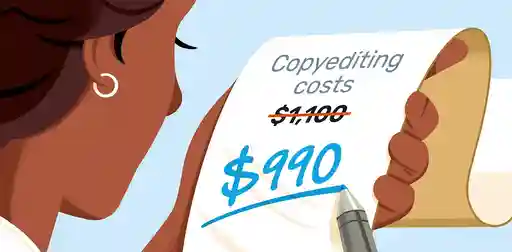Blog • Understanding Publishing
Last updated on Jun 27, 2022
What is Hybrid Publishing? Expectations vs Reality
Hybrid publishing is a publishing model that combines elements of traditional and self-publishing. In most aspects, a hybrid publisher functions just like a traditional publisher, with the important difference that authors subsidize most or all of the cost of publishing and are not given an advance on royalties.
Just like traditional presses, reputable hybrid publishers have editorial, design, and marketing teams. The idea is to help authors who would like a traditional-style publishing option but cannot, or prefer not to, work with a traditional publisher.
In theory, hybrid publishing is not the same thing as vanity publishing — but the reality can often be a little disappointing. Read on to find out what it’s like to work with a hybrid publisher.

Production costs
In traditional publishing, publishers buy manuscripts they believe in and shepherd them through every step of the publishing process, from editing to marketing. In other words, traditional publishers pay authors an upfront amount (an “advance”) for the right to publish their books, and so take responsibility for all production costs. Hybrid publishing is quite different.
Expectations: Costs shared with publisher
In hybrid publishing, the author fronts production costs, or sometimes shares these costs with the publisher, and doesn’t receive an advance. The publisher then takes care of the entire process (editing, marketing, etc.). The idea is that with a hybrid publisher, authors who don’t want to handle the editorial, design, and marketing work can pay someone else to shoulder those responsibilities.
Some authors crowdfund the initial costs by asking people to pre-order their book and using the money raised to pay the hybrid publisher. There is, of course, a catch: if the author doesn't manage to raise a minimum amount, the book is subject to cancellation.
Reality: A big investment with limited returns
At the end of the day, the hybrid publishing model means that the author foots a significant portion of the publishing bill, taking on the financial risk. In exchange, they have to trust that the press is doing what’s best for their book. If all doesn’t go to plan, the author has very little recourse to recover their investment.
If the book you’re writing has great commercial potential, you might be better off securing an agent and pitching to traditional publishers. Alternatively, if you’re willing to invest money, why not self-publish? That way, you can assemble your own team of professional editors and designers, and receive similar services while retaining more control… and keeping all the royalties.

MEET THE BEST PUBLISHING PROFESSIONALS
Polish your book with expert help
Sign up to browse 2000+ experienced editors, designers, and marketers.
Royalties
Speaking of royalties: let’s take a closer look at what working with a hybrid publisher will mean for your earnings.
Expectation: Better royalties than traditional publishing
Like self-publishing, hybrid publishing allows authors to rake in a bigger share of the royalties for every copy of a book they sell. To put things in perspective, a typical book deal with a traditional publisher nets authors 10-15% in royalties for a hardcover, 8-10% for a paperback, and 25% for an ebook. Hybrid publishing, on the other hand, can let the author rake in up to 50% in royalties.

Reality: Missing out on potential profit from self-publishing
Sure, hybrid publishing lets you keep a bigger share of royalties than traditional publishing. But why share your royalties in the first place, when you’re already taking on the financial investment and all the risks involved? Self-published authors get to keep up to 70% royalties on ebooks priced between $2.99-$9.99, 35% royalties on otherwise priced ebooks, and 40-60% on print books.
If you hire the right professionals to help you, you’ll still have all the practical support you’ll need — and you also get to keep the whole pie to yourself.
✅
Is self-publishing or traditional publishing right for you?
Takes one minute!
Editorial standards
At this point, you might be wondering how a hybrid publisher differs from a vanity publisher, which also takes your money in exchange for publication. Functionally, there’s little to separate their business models. A lot of it comes down to their editorial scruples.
To learn how to tell them apart from reputable hybrids, check out this guide to vanity presses.
Expectations: A publisher chooses your manuscript on merit
The ideal hybrid publisher is selective when it comes to the authors they work with, and will truly want to help shape and market the books they take on.
In 2018, the Independent Book Publisher's Association (IBPA) released a series of nine criteria to help define the standards for a reputable hybrid publisher. Many of these standards revolved around editorial control, including an ability to prove that they vet their submissions. Like a traditional publisher, a legitimate hybrid must ensure that the projects they take on will reflect well on their list of authors and have a reasonable chance of selling well.
Reality: They often aren’t concerned with quality
The above is an ideal scenario. Sadly, most publishers who call themselves “hybrids” are just vanity presses in disguise, trying to scam authors by misrepresenting their business model. A vanity publisher knows it's very difficult to market a book, and will pressure the author to pay for add-ons and extra costs that will supposedly boost their book's success. If they’re particularly odious, they will also hold the author’s intellectual property ransom down the line.
Remember: If they are willing to publish almost any author who is willing to pay them, then they’re not a hybrid publisher anymore — they’re a vanity press.
🚨 Be careful when approached by companies you haven’t heard of! Head to our post on publishers to avoid for a better understanding of how these companies mislead authors.
❓
Are you dealing with a publishing scam?
Take this quick quiz to see if you're dealing with a legit publishing company.
Distribution, Sales, and Marketing
You might be thinking: so hybrid publishers aren’t necessarily renowned for their artistic vision, but they’ll be able to help you with the practical task of distributing and marketing your book to help it sell well, right?. Well, you may need to adjust your expectations a bit.

Expectation: Getting your book into physical stores
Some of the most reputable hybrid presses have sales teams that help you get your print book into physical retail stores, which is definitely helpful for anyone who isn’t sure how book distributors work. However, we aren’t generally impressed with the efforts hybrids make to actually market and sell their books once they make it into stores, especially since we’ve seen self-publishing authors achieve success on their own.
Reality: Limited marketing help from your team
A hybrid publisher’s editorial and design departments might have solid standards, but without the marketing might of a larger company, they tend to struggle to secure publicity. Like a self-publishing author, you might end up having to take the lead when it comes to generating sales.
The problem here is that hybrid published books are much harder to market. Compared to self-publishing, hybrid-published authors don’t earn enough on sales to be able to run ads or invest money into marketing. Meanwhile the publisher also has limited resources put towards marketing purposes. Unlike traditional publishers, hybrid presses “only” make 50% on sales, so they have little incentive to boost sales, and tend to have smaller budgets in general. As a result, what hybrid presses do to survive is gradually increase production costs, resulting in an unsustainable publishing model which ends up hurting authors.
If you’re willing to learn about the basics of book marketing (and put them into action), you might find that you can reach a wider audience than if you rely on a hybrid publisher’s marketing department.
There it is — that’s all you need to know about hybrid publishing in order to make an informed decision. If you do decide to work with one, make sure it’s a trusted company that meets the criteria for reputable hybrid publishers, as set out by the Independent Book Publishers Association. Be vigilant, ask questions, and use the internet to your advantage. Good luck!






